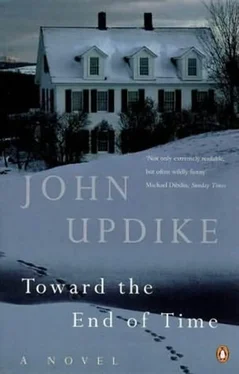John Updike - Toward the End of Time
Здесь есть возможность читать онлайн «John Updike - Toward the End of Time» весь текст электронной книги совершенно бесплатно (целиком полную версию без сокращений). В некоторых случаях можно слушать аудио, скачать через торрент в формате fb2 и присутствует краткое содержание. Жанр: Современная проза, на английском языке. Описание произведения, (предисловие) а так же отзывы посетителей доступны на портале библиотеки ЛибКат.
- Название:Toward the End of Time
- Автор:
- Жанр:
- Год:неизвестен
- ISBN:нет данных
- Рейтинг книги:3 / 5. Голосов: 1
-
Избранное:Добавить в избранное
- Отзывы:
-
Ваша оценка:
- 60
- 1
- 2
- 3
- 4
- 5
Toward the End of Time: краткое содержание, описание и аннотация
Предлагаем к чтению аннотацию, описание, краткое содержание или предисловие (зависит от того, что написал сам автор книги «Toward the End of Time»). Если вы не нашли необходимую информацию о книге — напишите в комментариях, мы постараемся отыскать её.
Toward the End of Time — читать онлайн бесплатно полную книгу (весь текст) целиком
Ниже представлен текст книги, разбитый по страницам. Система сохранения места последней прочитанной страницы, позволяет с удобством читать онлайн бесплатно книгу «Toward the End of Time», без необходимости каждый раз заново искать на чём Вы остановились. Поставьте закладку, и сможете в любой момент перейти на страницу, на которой закончили чтение.
Интервал:
Закладка:
The deer’s head was toward me, on the lowered tailgate, as if to be fed something, her lips slightly drawn back, a lavender sliver of tongue visible. There were little crusts of blood around her black nostrils, relic of the bloody foam she breathed in her last minute. Her eyes were open, long-lashed, coffee-brown globules in which our oaks and tall white house set vertical reflections like tiny submerged fins. The short-haired barrel of her body, dented by the removal of its intestines and multiple stomachs and liver and lungs and heart, emitted in the frosty morning a vapor of relative warmth, like the winter sea, and a helpless strong animal smell, of dry hair and damp hide and the pellets released from her tidy anus in the sorry unravelling of death. From the inner corners of the deer’s eyes flowed two dark markings, like tear trails. But the consciousness that had protruded into the two bright, snuff-flecked eyes had moved on, into another cosmic space.
John stepped toward me, exuding his own scent, of patiently absorbed woods and a hint of bad breath-he must have been a pipe-smoker, once, to wear down those teeth like that-as if to claim my congratulations. Gloria beamed in a happy daze behind his mottled shoulders. In his bulky camouflage outfit, and his intricately shaped knit cap, with its stump of a bill, he seemed princely, a groom at a pre-Christian wedding. The deer was his bride. Or was she mine, and he and Gloria the blessed pair on this gala day? It seemed plain enough that among the four of us my affinity was with the deer. Her conical slender face, with its coarse rubbery muzzle and indelible tear trails, gazed toward me; I could see myself move, a reflected splinter wearing a parka and no socks, in the orb of dulling gel.
With a woman in love, for a time, you can do no wrong; then you reach a point where nothing you do is right. I had reached that point with Gloria a while ago and felt hardly a flicker of jealousy as she with grave sweetness-North Shore Lady Bountiful clad in naught but thin cotton beneath her regal purple robe-thanked the hunter over and over, pressing his trembling hands in both of hers.
Uneasily including me, John told us, “After I do the butchering, I’d like to present you folks with a fine venison steak. You choose the cut.”
Class lines reasserted themselves. We both stiffened at the offer. Did he mean for us to point out our preferred slice right on the still-steaming corpse? It would be like eating a large rat. Jointly we covered our refusal with the sauce of insistent mannerly gratitude, but we had refused his, in a sense, flesh. As he stepped out of his hunting gear and tree costume, he seemed shrunken, smaller in size and in mystery. He put up the trunk tailgate, bending the deer’s head back so that I winced. Ow .

For a million years (or so), we didn’t know what the stars were. Witnessed primarily by the sleepless, by watchful shepherds and sailors and the madmen who became the tribal seers, the slowly spinning spatter of lights reappeared overhead at sunset by we knew not what necessity; we gave the most prominent of them names, and wove stories to bind them together, but such exercise of our fancies drew us no closer to the astonishing truth of their gigantic circumferences, their unthinkable mass, their unbearable heat, their ghastly distance from us, and their lives of atomic turmoil, of incessant explosions and elemental mutations, fusing hydrogen nuclei to form the two-proton, two-neutron nuclei of helium, and then in the convulsions of a supernova pressing helium into carbon, oxygen, neon, and ultimately iron.
Discovery of the stars’ nature had to await the invention of telescopes and spectrographs, which came about only after the rise and fall of many barbaric empires, led by kings proclaimed by their priests to be earthly embodiments of God. Their warfare, and the erection of monuments suitable in their grandeur to God-men, sluggishly propelled technology forward, through the invention of wheeled chariots, stirrups and saddles, catapults and rams, moats and portcullises, pulleys and booms, gunpowder, steam engines, radios, telephones, hydrocarbon-burning engines that could propel vehicles along the ground and even into the air, and so forth to the point where, a hundred years ago, it was understood that beyond the stars that a shepherd or sailor sees at night lie, across vast deeps of emptiness, conglomerations of more stars. These, fuzzy in their first sightings, were first called nebulae, and then island universes, and now galaxies. The numbers are so grand and round as to seem mere fabulations: a hundred billion stars in our own galaxy, a flattened spiral which is a hundred thousand light-years in diameter, and then a hundred billion galaxies beyond, of more or less the same size as our own. Such numbers numb us, else we would continually scream.
Scarcely fifty years ago-a mere wink in the history of our planet, a mere smothered yawn within the saga of our species-was it discovered that all the galaxies are rushing toward us at titanic speeds. Well, not all, for those the farthest away, at a distance of more than twenty-five billion years, are moving away, as a so-called “red shift” in their spectra inarguably reveals-which is to say, twenty-five billion years ago they were moving away. Now-but “now” makes no sense in cosmic terms. The farther we look, the more ancient is what we see. Inside this remote and ruddy ring of apparent recession there is a ring of stasis-of pause, of hesitation-twenty-four billion or so light-years away, and inside that the stars begin to scream blue. At first they murmur, but the nearer they are, the more distinctly and uniformly blue they are, since within a radius of five billion light-years we are looking into the relatively recent past. Some are rushing toward us at a considerable fraction of the speed of light.
It is clear what is happening: the universe is collapsing. The red shift on the periphery is very old news, testifying to a former expansion. There is much scientific speculation about the expansion. How did it happen? The collapse seems normal and inevitable: gravitational attraction, the most feeble but most relentless of the basic forces, is pulling everything home, to a singular core-a point, infinitely small and dense, of nothingness. But why did nothingness ever leave home, as it were? What placed the stars and galaxies, the quasars and black holes and oceans of neutrinos out there? Whence this inordinate amount of sparkling dust?
Out there-down there, up there-there must be or must have been, in the concentric rings of time, other souls. Indeed, the virtually infinite numerousness of heavenly bodies argues that somewhere, somewhen, I had or have an identical twin, amid a galaxy of brothers who resemble me closely. The odds are gigantically for it. Yet no proof has ever arrived. The distances have stifled with delay whatever radio signals or spaceships other populations might have launched. An impeccable silence hangs as answer to the great Who? Not that my twin would be any less puzzled than I-else he would not be my twin.
The long-range prospect appears clear. If the red-to-blue shift can be dated to plus or minus twenty-five billion years ago, the collapse will continue nearly that long before local effects can be observed. The background cosmic radiation of 2K °will rise to 3K °, it is estimated, in ten billion years. From this point the universe will halve its dimensions in three and a half billion years and keep accelerating. In ten billion more years, the background radiation will have risen to 300K °. This is still cold, too cold for even the toughest life forms, but our planet will slowly become unable to divest itself of heat. Our glaciers will melt, and then our oceans will evaporate. A mere forty million years later, the background radiation will match the temperature needed for the creation and sustenance of life; but life will have vanished on our scorched planet, if it has not already been engulfed by the expansion of the local sun into a red giant. The background radiation-the temperature of space-has risen to 300C °, or 572F °, and will continue to rise as the universe halves in dimension every few millions of years. The galaxies will have merged, but star collisions will still be rare, there is so much empty space to eat up. The night sky will begin to glow a dull red. In time it will turn yellow, then white. The universe will be a furnace, an oubliette with white-hot walls. All planetary atmospheres will have been stripped; all life-forms, however ingeniously evolved in their crannies and lightless depths, will be remorselessly incinerated. Unable to radiate their heat away, the stars will explode; space will become a hot plasma of compressing gas. The rate of change will enter a scale of hundreds of thousands of years, then mere thousands, then centuries, days, minutes, seconds, split-seconds. As the temperature climbs to billions of degrees, atomic nuclei will disintegrate. In the compression of matter, protons and neutrons will no longer exist; the thick soup of unbound quarks will weigh trillions of tons per thimbleful. Black holes, those hells of absolute density, will merge with one another. Not just matter but space itself, taking with it time, will be crushed out of existence, and I and my soulmate, my certain twin in the expanding dust of aeons and aeons ago, will be one or, to be exact, no one.
Читать дальшеИнтервал:
Закладка:
Похожие книги на «Toward the End of Time»
Представляем Вашему вниманию похожие книги на «Toward the End of Time» списком для выбора. Мы отобрали схожую по названию и смыслу литературу в надежде предоставить читателям больше вариантов отыскать новые, интересные, ещё непрочитанные произведения.
Обсуждение, отзывы о книге «Toward the End of Time» и просто собственные мнения читателей. Оставьте ваши комментарии, напишите, что Вы думаете о произведении, его смысле или главных героях. Укажите что конкретно понравилось, а что нет, и почему Вы так считаете.












